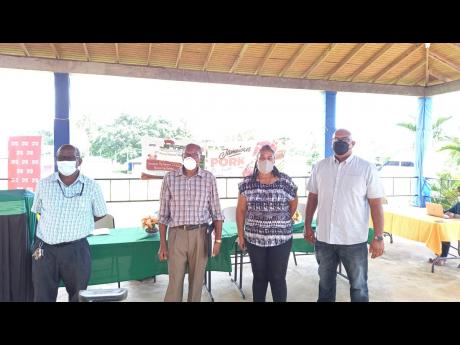African swine fever could devastate pig farming, says veterinary officer
The re-emergence of the dreaded African swine fever is weighing heavily on the minds of pig farmers across Jamaica.
Dr Osbil Watson, chief veterinary officer in the Ministry of Agriculture and Fisheries, said that with the disease usually recording a mortality rate of up to 100 per cent, the effects on the industry could be devastating.
“We are hoping it never gets here because of the devastating nature of this disease. It means that a farmer can lose his entire swine herd if they get infected, because the only way of controlling this disease is stamping out - meaning, you literally have to slaughter all animals that were in contact with infected ones and dispose of the carcasses,” he told T he Gleaner.
Watson, speaking on the sidelines of the Jamaica Pig Farmers Association’s (JPFA) 19th annual general meeting at the Denbigh Agricultural Showground in Clarendon last Thursday, said the disease poses a grave threat to the livelihood of farmers, with the knock-on effects expected to reverberate throughout the economy.
Among the concerns is a possible slump in the consumption of pork and pork products.
Watson, however, sought to assure farmers that the disease does not affect humans.
He told The Gleaner that his team has been keeping farmers abreast through the print and social media. Watson bemoaned, however, that the COVID-19 pandemic has hurdled the association’s efforts, adding that community-based outreach activities have gone virtual. In his presentation, he noted that the National Emergency Animal Disease Committee is in a state of readiness to offer support to farmers.
Financial challenges
Hannif Brown, who was voted president-elect at the meeting, spoke of the financial challenges pig farmers have been enduring since the start of the year. Brown lamented that the production cost has increased by some 34 per cent. “This was mostly due to feed costs, labour, electricity and other inputs, such as medication, which have all gone up significantly. Feed cost represent some sixty-five (and in some cases seventy) per cent of the cost of production,” he said.
In May, the Ministry of Agriculture and Fisheries announced that the cost for pork and pork products were expected to go up between 13-20 per cent.
Brown explained that the mounting costs fuelled the JPFA to issue suggested prices as a guide to farmers some three months ago. He said the suggestions were to ensure farmers made a profit, while being able to efficiently cover production costs.
“Currently, we’re looking where that price will have to go up because since that 90 days and now, we have had about two to three increases in feed again, and we are hearing that electricity is gonna increase and as such, we will be revisiting the current cost of production for pork,” Brown said.
With the increase in feed prices, some Portland pig farmers indicated that the cost of their meat have climbed to $450 per pound from $350. For Javian Bassier, however, a pig farmer in Clarendon, his meat has gone up from $250 to $350 per pound. In light of the African swine fever, Bassier said he has since ramped up sanitation practices on his farm, including sanitising all vehicles entering his farm.


